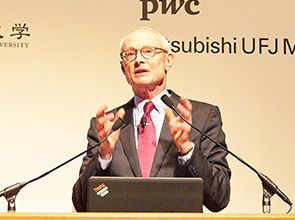Conference on Competitiveness
Keynote Lecture: "How Smart, Connected Products are Transforming Competition and Companies"
Professor Michael E. Porter, Harvard University
 Although the word "IoT" ("the Internet of Things") is commonly used, the Internet is nothing but a pipeline. What is important is the products that have changed--namely, smart, connected products (hereafter, SCPs). SCPs will not only change the manufacturing industry, but all others too, including the service industry.
Although the word "IoT" ("the Internet of Things") is commonly used, the Internet is nothing but a pipeline. What is important is the products that have changed--namely, smart, connected products (hereafter, SCPs). SCPs will not only change the manufacturing industry, but all others too, including the service industry.The Third Wave of IT-Driven Competition
In the first IT-driven wave, IT was introduced into processes within companies, and value chains were automated. In the second wave, value chains got distributed across regions with cheap Internet connectivity and unified companies with suppliers and customers. Productivity rose drastically, but the value chain did not change much. SCPs are the third wave, where IT has become a part of the products, and products have become embedded in systems. SCPs are changing industry boundaries. Industries that were separate must now be considered interconnected. This wave is different from the earlier two in that it changes the definition of products and companies.The Four Capabilities of SCPs
SCPs have four capabilities that greatly heighten product value.- Monitoring:
- Ability to determine the location and condition of the product at all times. Relationship with customer continues even after sale.
- Control:
- Ability to remotely control the product using software. Products can be personalized without extra cost.
- Optimization:
- Ability to optimize on the basis of environment and conditions, drastically improving productivity.
- Autonomy:
- Ability to autonomously operate some functions of the product or the product as a whole.
The Role of Humans
Humans have extremely high capabilities. They are flexible and creative, and have emotions. Human-machine interfaces (HMI) that connect the physical, digital and human are important in order to leverage human strengths to the maximum. Combining human strengths with SCPs can prove to be extremely effective. Interfaces such as augmented reality (AR) will be important for this purpose.The Impact of SCPs on Competitive Strategy
What value will SCPs provide? Will the current distribution channel work as it is, or will it not be required at all? For example, Tesla Motors produced new value and changed its value chain using SCPs in an industry where differentiation is difficult. (Tesla Motors sells vehicles directly to consumers without involving car dealers.)However, along with opportunities, SCPs will also give rise to threats. Many industries are undergoing a shift from owning to sharing, as possibilities of new competition emerge. SCPs produce opportunities as well as threats.
As a part of their strategy, companies must select their business scope. They must decide whether to expand or to hold on to their strengths while making collaborations with others easy. Value chains, particularly product development and after-sales services, are likely to change completely.
SCPs contribute to society by improving productivity and safety and reducing environmental burdens. Even low-skilled workers may become able to perform high-value-added jobs with the help of data and on-site guidance. I think SCPs offer more opportunities than threats.
Companies that do not grab the opportunities inherent in SCPs and act rapidly to make use of technology might risk their future. It's a "once-in-a-century" chance.
Winners PDF
- 第17回 ポーター賞受賞企業・事業 PDF (All of the award company in this year are published. )






